For disabled U.P. vet, community events are a matter of life and death
K.I. SAWYER AIR FORCE BASE — His hands were trembling. They trembled as he set up tents for the event. They trembled some more as he tried to tie American flags to their poles. And when he stopped to take a break, they trembled most of all.
“I got Parkinson’s and I’m not going to live very much longer,” Ryan Lipinski said flatly. “That’s why I shake.”
Lipinski is a 47-year-old Army veteran who got hurt in a training exercise two decades ago, causing a traumatic brain injury that he’s convinced led to the onset of Parkinson’s disease, which is now quickly stealing control of his body from him.
He was standing outside on a sunny winter’s day, setting everything up for the annual K.I. Sawyer Cardboard Sled Races, which he founded four years ago so kids living on this former air base would have something fun to do in the middle of the long U.P. winter. It was just one of many events he singlehandedly created in his neighborhood.
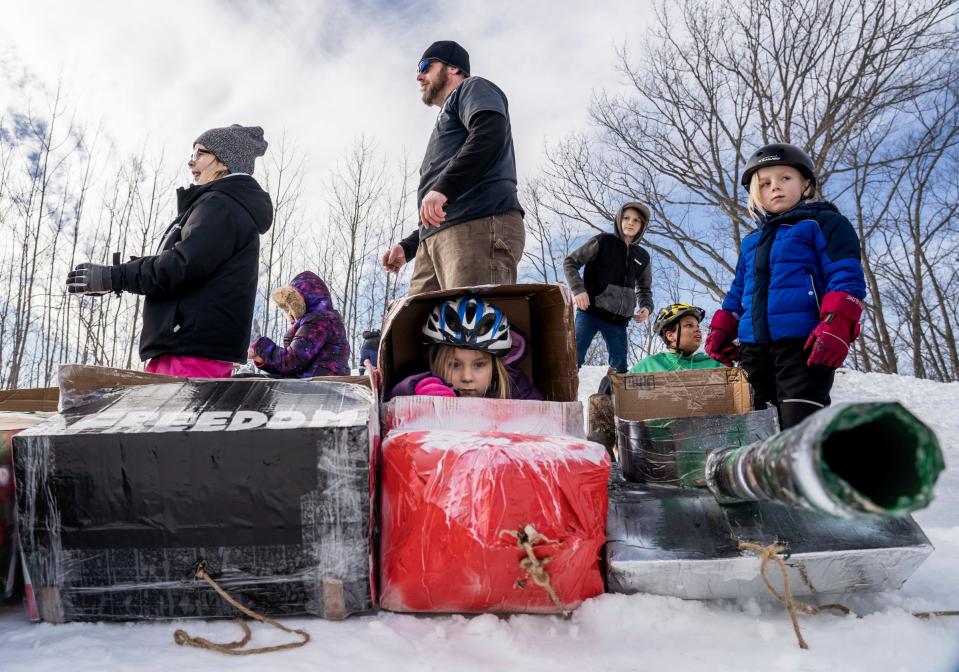

Dozens of kids were arriving with their families, carrying sleds they’d worked on for days. One sled looked exactly like a small church, with colored windows and a steeple. Another was a big, round flying saucer. There was an airplane sled with paper wings. One kid simply brought the box his new keyboard came in at Christmastime. A few carried nothing but unadorned slabs of cardboard to ride down the hill just so they could be part of the fun.
“This is going to be a good time,” said Duane Duray, 54, the manager of the nearby Sawyer International Airport, who came to volunteer. “There’s people who are not even associated with the community that Ryan manages to corral in just because he has so much enthusiasm. And you can tell he’s got some impairments with him, and some challenges in life that he’s encountered through his military service, but he’s nonstop all the way. Most people would say, ‘You know what? I got my own problems to worry about. that’s all I’m going to deal with.’ ”
But Lipinski was there. He had to be. In a way, his life depended on it.
* * *
His dog was the first to notice something was wrong.
“Ralph used to sit beside me no matter where I’d be in the house, and he’d pop his head up so that I could pat him on the head,” Lipinski said. “And I noticed that I couldn’t pat his head anymore. I was like, ‘What’s going on?’ And I think he noticed it too, because he would lift his head higher and put it on my lap so it was easier for me. Now that I think about it, he might have known what was going on even before I did.”
Lipinski was born in California, the son of a naval commander and an opera singer. He joined the Army, became a medic and was participating in a training exercise in 2003 when he fell 20 feet off a wall, injuring his brain, shattering his spine and severing a nerve in his leg. That was the end of his military career and the beginning of his decline.
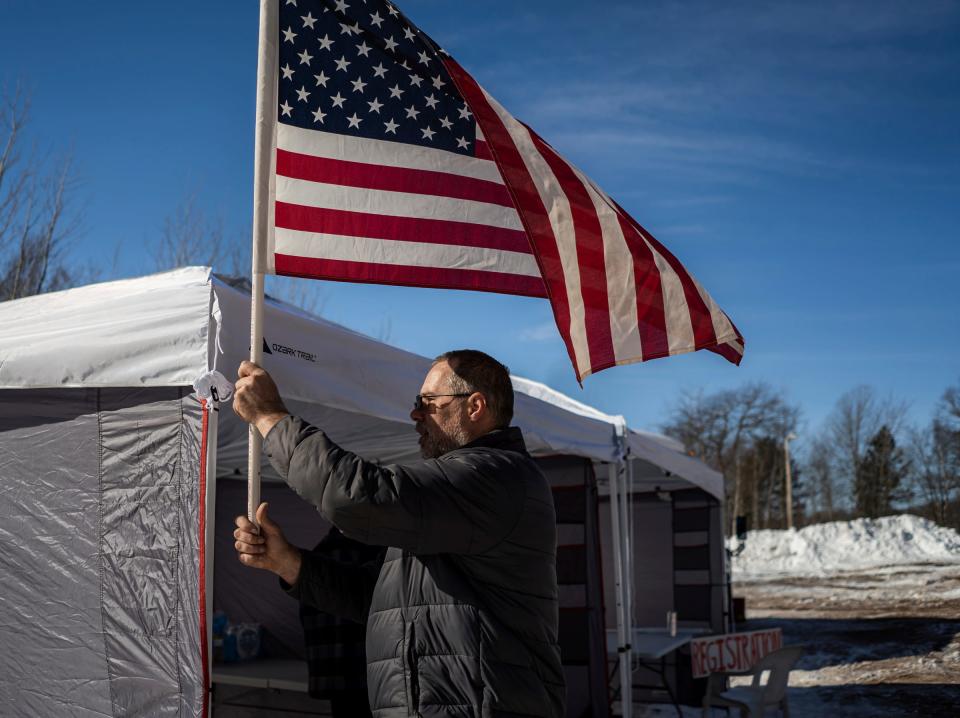
About five years ago, he noticed some worrisome changes. He began stuttering a little. He stumbled during once-easy walks through the woods. He sometimes fell off his BMX bike while doing the kind of simple tricks he once did with ease, back when he was featured in bike magazines for his skills. And he couldn’t pet his dog anymore.
Parkinson’s disease is a degenerative brain condition that causes a loss of muscle control, slowed movement and uncontrolled tremors, all of which grows worse over time. There’s no cure, although some medications can slow its progression. And doctors tell patients that activity is key to delaying its progression, no matter how difficult it gets to do.
“Before this, I’d get up in the morning, get dressed and I’d go hiking, backpacking, mountain climbing, all kinds of sports and activities,” he said. “And now I get up and I want to go, and I try very hard to go, but I just can’t. I have all this stuff I want to do, even if it’s just around the house, but it’s so hard to make myself do it. And the longer I go without doing stuff, the harder it is doing stuff.”
The first doctor he saw told him he’d be dead in five to eight years. “I told him, ‘No, I’m not,’ ” Lipinski said. “That was five to eight years ago.”
He read about a doctor who said bicycling, in particular, seemed to slow the disease’s progression. So he bought a bike and rode it clear across the country, over and over, north to south, east to west.
Until he got hit by a truck.
“I was riding down the road and this semi comes out of nowhere and runs me over. Everything went underneath the semi, chewed it up like a blender and I flew out into the ditch.” Next thing he knew he was spending a summer recovering back in Michigan with his new titanium body parts, dealing with yet another health setback that left him sedentary when he could least afford to be.
But as soon as his injuries healed, he got back onto the bike and finished the trip that had been interrupted.
Still, his disease keeps advancing. Doctors told him that even if he lives longer than first expected, he’ll eventually be rendered immobile and confined to a bed or a wheelchair, then to a prison inside his own body from which he’ll be unable to communicate with the outside world, when he’ll need round-the-clock care until he dies. It puts him in a race against his disease in which he must keep moving to outpace it, because every idle moment gives it time to further rob his body.
“I’m trying to stay as active as possible and do as much as I can,” he said. “If all I did was sit on the couch for the next year I wouldn’t be able to get back up. But if I get up every day and do something, I get a few extra years.”
Just when he needed it, he found something to do right in his own backyard.
* * *
K.I. Sawyer Air Force Base was once like its own city, one of the biggest communities in the Upper Peninsula. At its peak, the base had more than 7,000 residents, and they had their own police and fire departments, bowling alley, movie theater, roller rink, bank, hotel, restaurants, and beauty and barber shops.
The base was established just south of Marquette in 1954 as a first-line defense against a potential Soviet missile attack from over the North Pole. But the Cold War ended and so did the need for the base, and by 1995, the Air Force left, taking 4,600 jobs and a fifth of the county’s economy with it. The closure drained students from local schools and customers from local restaurants and stores, many of which didn’t survive the loss. The property was sold to developers, some of whom turned the housing into cheap rentals that quickly filled with drug dealers and criminals drawn by the low rents and lack of police patrols. Two townships split responsibility for what remained after the military left, leading to confusing and uneven enforcement of laws. The area gained a reputation as a crime-riddled slum, particularly after the feds busted a Detroit-to-K.I. Sawyer heroin and cocaine pipeline in 2015 that was flooding the Upper Peninsula with drugs.
Nowadays, about 3,000 people live on Sawyer, as it’s called by residents. A third live below the poverty line. About a third are unemployed. Long rows of abandoned barracks sit with broken windows, and empty fields dot the landscape.
But residents say they’ve worked hard to turn things around. “It’s totally different than it was,” said David Rushford, 67, a former board member of the Sawyer Operations Authority, an organization formed to foster improvements on the former base. He and his wife moved here seven years ago after they felt a spiritual calling to help the area. “It’s changed a lot. It’s not just a bunch of garbage and riffraff.”
Although the population has actually increased in the past few years, reversing a long decline, Sawyer’s bad reputation, he admitted, stubbornly lingers.
“We’re still fighting it,” he said.
Lipinski moved here after his training accident to recuperate at his brother’s house, and he stayed after meeting his future wife at school. He couldn’t work anymore after the onset of his Parkinson’s, so out of boredom he started attending meetings of the Sawyer Operations Authority, during which people would discuss ideas for improving the neighborhood, where there was virtually nothing fun to do once all the businesses closed and the county shuttered the rec center. One day, a resident said she’d like to see little free libraries on the former base to encourage people to read more. It caught his attention.
Some things make his hands tremble more. Cold weather, for example. Being idle, in particular. Even just thinking about his condition, or focusing on the trembling, makes it more pronounced. But if he’s immersed in an activity, he discovered, his hands somehow tremble less. So he built six little free libraries for her, and he found a calling.
“Before me, there wasn’t anything going on in the neighborhood,” he said. “There was nothing out here for the kids to do. If we can keep all age groups busy, the less vandalizing happens on the neighborhood, and the crime rates drop a little. People were always complaining about nothing going on in the neighborhood, so I said, “Well, I can do this.’ ”
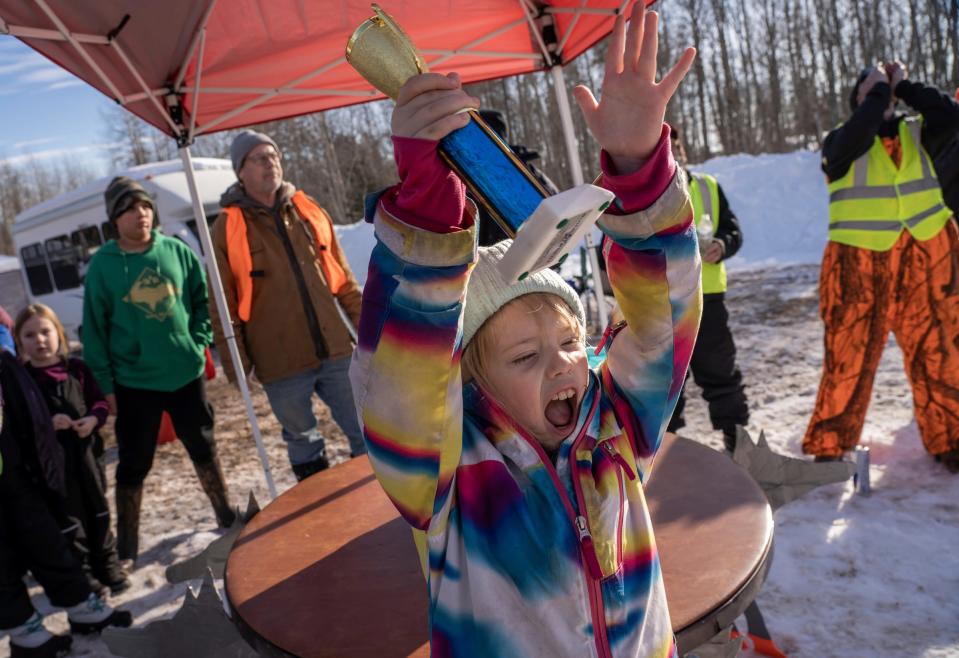
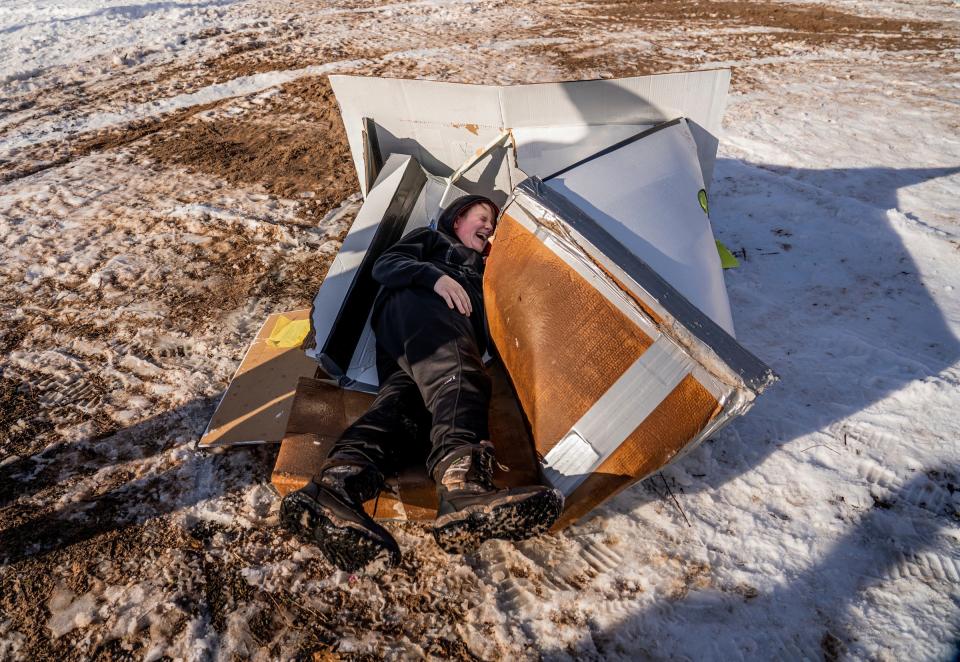
He started holding community barbecues in the commons area behind his house. He refurbished an old fitness trail. He came up with a Nerf wars event. He hosts an annual Christmas program for the elderly people of the area in which they get Christmas presents from Santa, who delivers them in person. He gets unclaimed bikes from the police, fixes them up and gives them free to kids. He gives out Christmas dinners to families, along with a Christmas tree, lights, decorations and gift-filled stockings. He holds an annual Easter egg hunt, a party to mark the end of summer, and something called the March Musical Snow Stomp, in which he leads the neighborhood’s children through the streets of the old base, banging on drums and tambourines and playing toy musical instruments to chase away the last remnants of winter, like something from an old fairy tale. And he keeps making up new things for his neighbors to do.
“Either next year or the year after I’m not going to be able to do anything, whether I’m dead or not, at the rate that I’m progressing,” he said. “So if I’ve only got a couple years left, I’m going to try not to focus on what I can’t do or what’s not going to happen next. I try to focus on what I’m doing. And this way, everybody’s having fun, and it’s fun to see all the little kids smiling and happy.”
* * *
It took him half an hour to awaken his muscles and get out of bed on the morning of the races. Then it took another half hour for him to be able to bend over to put on his shoes. Even then, he was moving slower than usual. The day before had been a rough one.
“Yesterday, I quite possibly had a mini stroke,” he said. “My whole right side went numb and dead, and I couldn’t talk. We don’t know for a fact that it was a stroke, but it had all the symptoms. It’s all working now, but my head isn’t all there.”
He came out to the living room and eased into his recliner, and along with his cats watched a flock of birds eat from feeders hanging outside the front window. He ate a corn dog for breakfast, mostly because his wife urged him to eat something despite his lack of appetite, and that was all he could handle. The Parkinson’s, she said, makes him shake hard even when he’s asleep, which burns all his energy, and he wakes up sick with severely low blood sugar.
After almost two decades of marriage, she’s now his official caretaker.
“You smile and nod and you just make it work, because you’re not going to win but you fight the battle anyway,” said Adda Lamon, 39, who works at a local animal shelter. “It could be a lot worse. We spend what time we can doing the fun stuff now. And this keeps him busy. He feels like he’s doing things and making a difference and fixing things.”
His enthusiasm about events for Sawyer had spread. The county came the night before and plowed a clearing for parking. Someone else groomed the hill. The local Lions Club acted as host and provided volunteers. A local caterer served free hot dogs, and there was free hot chocolate and coffee, too. Kids squealed and played in the snow while they waited for the race to start.
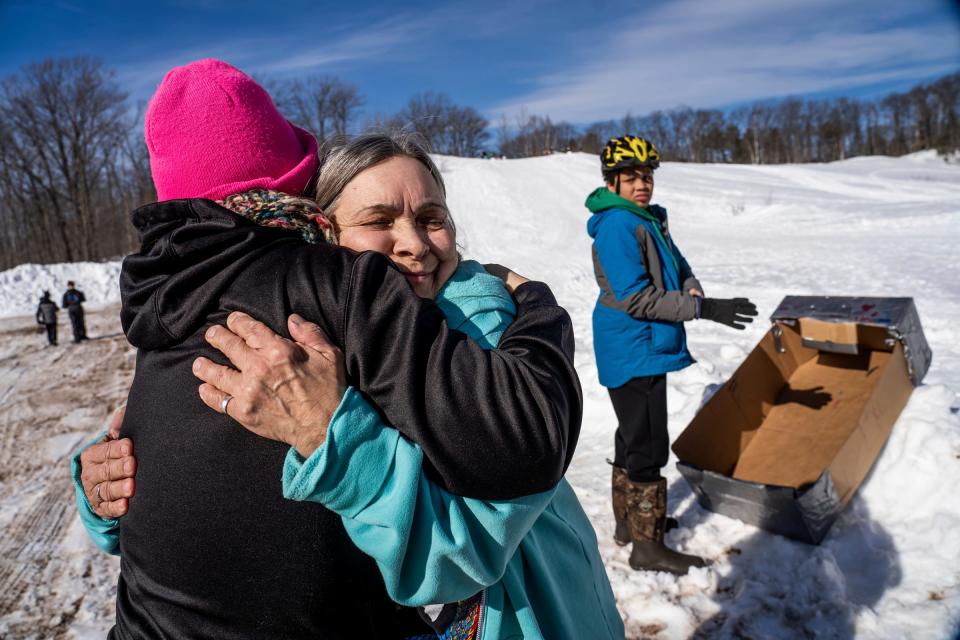
“It’s incredible and it’s already looking like it’s bigger than last year,” said Geriann Bialkowski, 61, who brought several grandkids with the sleds they spent hours constructing the night before. Behind her, parents sat in lawn chairs in the cleared lot, waiting for the race to start. “And I pray that it continues to get bigger and bigger, ‘cause it’s such a fun time for the kids. It’s family time and community and unity.”
Lipinski drove the short way from his house to the hill and immersed himself in tasks. He set up the tents for food and registration. Marked out parking spots by spray painting the snow. Delegated tasks for the volunteers. Fielded phone calls and questions. Made sure that flags were flying. Created a display of the little golden trophies he got for the kids who would win Best Finish, and Coolest Sled, and Best Crash.
“Ryan is incredible,” said Rushford, standing by his parked church bus, which he left idling so people could warm up inside it if they got too cold. “What he does for the community is outstanding. He is a spark plug for Sawyer. He does so many things. And then considering he’s dealing with the Parkinson’s, it’s just amazing.”
Lipinski stood at the foot of the snowy hill. All the kids waited at the top with their sleds. The crowd was gathered behind him. He lifted the megaphone to his mouth. “Y’all ready to race?” he asked. And his hands were barely trembling at all.
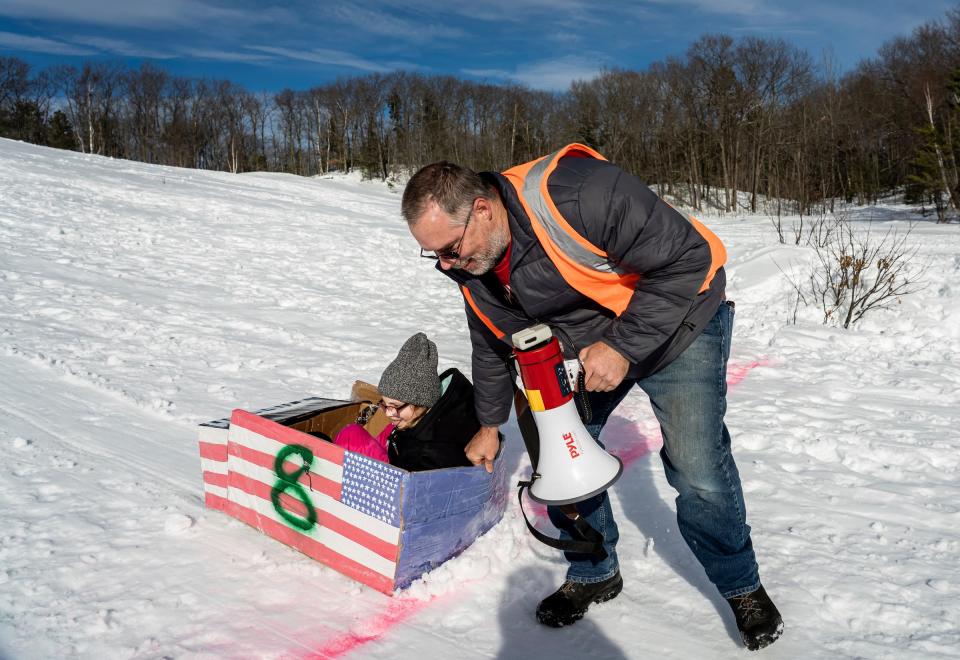
John Carlisle writes about Michigan. His stories can be found at freep.com/carlisle. Contact him: jcarlisle@freepress.com. Follow him on Twitter @_johncarlisle, Facebook at johncarlisle.freep or on Instagram at johncarlislefreep.
This article originally appeared on Detroit Free Press: Ryan Lipinski starts K.I. Sawyer Cardboard Sled Races for neighborhood

